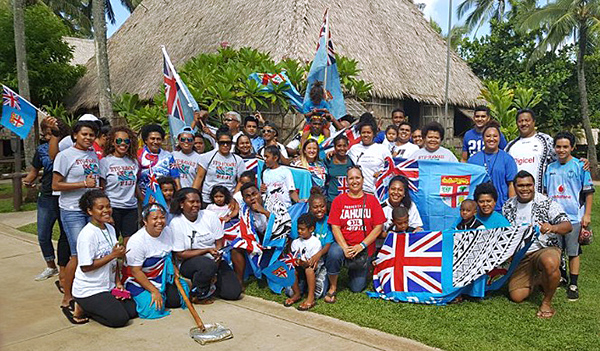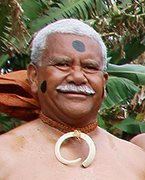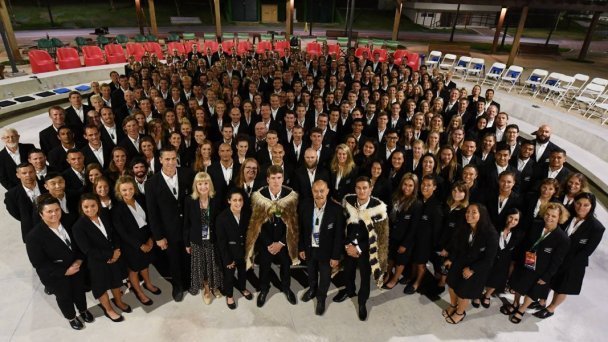PCC Fijians celebrate Olympic gold
“Rugby is Fiji’s national sport. It’s very popular,” said PCC Fijian Village “Chief” Ratu Seru Inoke Suguturaga . . . so it’s no surprise that Fijians at the Polynesian Cultural Center, back home in the islands and around the world, as well as many other Polynesians, have been celebrating ever since the Fiji men’s Rugby 7s team decisively defeated Great Britain, 43-7, in the 2016 Rio de Janeiro Olympics finals to capture their first-ever gold medals.

Fijians and other rugby fans at the Polynesian Cultural Center celebrate Fiji’s Gold Medal
Rugby is said to have started at Rugby School in Rugby, England, in 1823 when a European-style football player picked up the ball and ran with it. Over the ensuing years the game, introduced to the South Pacific by the British, evolved into matches of 15-man teams who played two 40-minute halves. Rugby 7s — sometimes called Seven-a-Side and aptly named after the number of players on each team, who today play two seven-minute halves — started up in 1883 and has become increasingly popular for its faster-moving free-flowing action. This was the inaugural Olympics Seven-a-Side competition; 15-a-side rugby was last played in the 1924 Paris Olympics.
In Rio, the Fijian team — comprised of Jerry Tuwai, Jasa Veremaiua, Leone Nakarawa, Vatemo Ravouvou, Josua Tuisova and Viliame Mata, with Osea Kolinisau as captain — advanced to the quarter-finals as one of eight teams selected during three four-team-bracket round robin play.
In receiving their respective gold medals presented by England’s Princess Anne, the team received extra media attention when each member kneeled before her and then clapped three times afterward — a customary expression of deep respect.

Inoke Suguturaga, Polynesian Cultural Center Fijian Chief
Suguturaga said 30,000-plus fans had gathered in the national stadium in Suva when the team returned to Fiji. “There was a huge celebration in Fiji when they arrived, and they were each given the Fiji Order of Merit [award] in recognition for their efforts. They were given financial awards as well.”
“Monday [August 22] in Fiji was a national holiday in honor of the victory,” Suguturaga continued. “We had our own little parade in Laie on Saturday [August 20] with the students and the community. We culminated with a breakfast in the Fijian Village.”
He stressed that while Fiji had previously sent athletes to both summer and winter Olympics over the years, “this was the inaugural Olympics for Rugby Sevens. As a build-up, our Fijian team won the last two rugby sevens world series.” He added that another Fiji National Rugby League [another variation of the game] team recently defeated Canada at Aloha Stadium in Honolulu.
Vinaka vakalevu — CONGRATULATIONS, Fiji!
Other islanders also stand out in 2016 Olympics
While the Fijians earned Olympic golden glory for the men’s Rugby 7s victory in Rio, other Polynesian athletes and countries, as well as Pacific Island “cousins” were also well represented.

For example, Polynesians gained significant publicity during the opening ceremonies when Tonga’s handsome flag-bearer — Pita Taufatofua, a taekwondo athlete — led his island nation’s relatively small team in the parade of nations while dressed in a ceremonial-style tupenu wrap-around . . . but it was his bare chest glistening with traditional coconut oil that caught the attention of the cameras and audience members: He was literally shining under Rio’s Olympic stadium lights!
Coconut-oil-smeared dancers and cultural dignitaries are relatively common in Polynesia, so island folk either laughed or wondered what all the fuss was about, but that was definitely Taufatofua’s moment of Olympic glory, who otherwise lost and was eliminated in his first round of competition.
In addition to Tonga, other Polynesian island teams included American Samoa, Cook Islands, Fiji, New Zealand and independent Samoa. Several players with Hawaii ties were also members of USA teams.
Among these, it should be noted that:
USA women’s gold-winning water polo team goalie, Sami Hill — a Samoan who graduated from UCLA — has strong family ties to the Polynesian Cultural Center: Her father, Pe’a Hill, worked for the PCC years ago before moving to California, and her grandfather, Francis Hill, also worked at the Center. In fact, Sami still has relatives working at PCC.
“Isn’t that great? Wasn’t she incredible?” said first cousin Susan Kunz, PCC E-Commerce Webmaster for shop.polynesia.com (who was featured in our last enewsletter).
 By far the largest number, about one-fourth of New Zealand’s 200-plus athletes and officials are of Maori descent. Of these, we note that the team’s parade of nations flag bearers during the opening ceremonies wore traditional Maori korowai or feathered cloaks.
By far the largest number, about one-fourth of New Zealand’s 200-plus athletes and officials are of Maori descent. Of these, we note that the team’s parade of nations flag bearers during the opening ceremonies wore traditional Maori korowai or feathered cloaks.
Picture courtesty of Maori Television
One of them, Blair Tuke, won gold in Men’s 49er Sailing. Other Maori New Zealander winners include Lisa Carrington, who took gold in Kayaking; Mahe Drysdale, who claimed gold in the men’s Single Scull Rowing event; and women’s Shot Putter Valerie Adams, the defending champion from the 2012 games (who got married just after the games), took home a silver medal.
Three other Maoris were part of the Australian Olympic team. Additionally, Richie Walker served as the Head Coach for the USA Women’s Rugby 7s team.
And while no decision had been rendered as of our e-newsletter press deadline, one other Polynesian athlete may be declared Samoa’s first-ever Olympics medal winner post facto, pening a final ruling:
Female weightlifter Ele Opeloge could be elevated to the silver medal winner IF doping violation charges against 11 other female athletes are upheld — specifically the silver medallist in the 75kg-plus event. Opeloge, whose uniform showed her Samoan malu (or women’s tattoo) came in a heartbreaking fourth in that category by just one kilogram shy of Ukrainian lifter Olha Korobka during the regular competition.
Other Pacific island teams included Guam, Kiribati, Marshall Islands, Micronesia, Nauru, Palau, Papua New Guinea, Solomon Islands and Tuvalu. Only one or two athletes represented some of these teams. (With apologies to any other Polynesian athletes and/or winners inadvertently left off this list.)
Story and images by Mike Foley
 Mike Foley, who has worked off-and-on
Mike Foley, who has worked off-and-on
at the Polynesian Cultural Center since
1968, has been a full-time freelance
writer and digital media specialist since
2002, and had a long career in marketing
communications and PR before that. He
learned to speak fluent Samoan as a
Mormon missionary before moving to Laie
in 1967 — still does, and he has traveled
extensively over the years throughout
Polynesia and other Pacific islands. Foley
is mostly retired now, but continues to
contribute to various PCC and other media.

Recent Comments